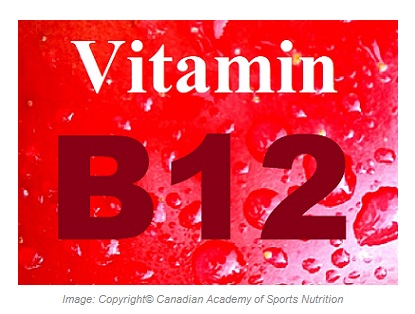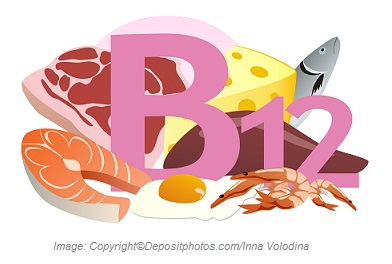 of red blood cells, the metabolism of carbohydrates, fats and proteins, and protecting the myelin sheath of the nerves. Being famous as the “red vitamin”, cobalamin has a cobalt atom in the center of corrin ring.
of red blood cells, the metabolism of carbohydrates, fats and proteins, and protecting the myelin sheath of the nerves. Being famous as the “red vitamin”, cobalamin has a cobalt atom in the center of corrin ring.
Functions of Vitamin B12:
- It is the cofactor for the enzymes methylmalonyl coenzyme A (CoA) mutase and methionine synthase.
- In the form of 2-deoxyadenosyl, it is important for the production of energy within mitochondria.
- It is required for the production of red blood cells.
- It is necessary for the metabolism of the nerves especially their myelin sheaths.
- It is needed for DNA and RNA.
- It has a key role in the production of SAMe (S – adenosylmethionine), a mood – elevating compound in the body.
- It promotes the utilization of macronutrients (carbohydrates, fats, and proteins).
- It is required for generating energy.
- It lowers homocysteine levels and reduces the risk of heart disease.
- It is important for the production of choline.
Food Sources of Vitamin B12:
The best food sources are red meats and organ meats such as liver, kidney, and  heart. Other foods rich in vitamin B12 are fish (especially mackerel and herring), dairy products, egg yolks, and seafood. Spirulina and fermented food such as miso and tempeh may contain small amounts of vitamin B12.
heart. Other foods rich in vitamin B12 are fish (especially mackerel and herring), dairy products, egg yolks, and seafood. Spirulina and fermented food such as miso and tempeh may contain small amounts of vitamin B12.
There is no vitamin B12 in vegetables and fruits unless they are contaminated by vitamin B12 – producing bacteria. A very small amount of vitamin B12 is produced by bacteria in the small intestine as well.
Absorption of Vitamin B12:
Vitamin B12 has two mechanisms of absorption. The first mechanism is passive absorption. It occurs in the mouth, and upper and lower parts of the small intestine. This type of absorption is rapid but extremely insufficient, with less than 1% of an oral dose being absorbed by this process.
The second mechanism is active absorption, which occurs through the terminal part of the small intestine (ileum). It is mediated by the intrinsic factor (IF) released by the stomach. Dietary cobalamin is released from its binding – protein by enzymes in the stomach. Then it rapidly binds with a salivary glycoprotein named haptocorrins (previously called as “R Binders” or transcobalamin I). The cobalamin – haptocorrin complex is carried to the upper and middle parts of the small intestine, wherein haptocorrin is digested by pancreatic enzymes, and cobalamin is attached to intrinsic factor (IF). Then cobalamin – IF complex is carried to the terminal section of the small intestine (ileum), wherein it is absorbed into intestinal cells. Subsequently, IF is destroyed and cobalamin is transferred to the liver by transcobalamin II.
The body of an average person stores 2 – 3 mg of vitamin B12, which is sufficient for 3 – 4 years if supplies are completely cut off. Adults lose up to 3 mcg of vitamin B12 daily in the urine and stools. Also approximately 1 – 5 mcg of cobalamin is excreted from the liver into the upper part of the small intestine through bile daily. This cobalamin binds to IF, and most of it is usually reabsorbed. In fact, up to 5 mcg of cobalamin circulate each day between the liver and the intestine.
Athletic Benefits of Vitamin B12:
- May delay fatigue and exhaustion by involving in the production of energy.
- Helps with protein synthesis.
- May assist building muscles.
- Acts as a cofactor in the conversion of creatine into creatine phosphate.
- May promote mental alertness.
Non – Athletic Benefits of Vitamin B12:
The following conditions may benefit from vitamin B12:
- Anemia.
- Chronic fatigue syndrome.
- Fibromyalgia.
- Depression.
- Age – related macular degeneration (AMD).
- Alzheimer’s disease and other dementias.
- Bell`s palsy.
- Male infertility.
- Canker sore.
- Asthma.
- Cystic fibrosis.
- Crohn`s disease.
- Migraine.
- Trigeminal neuralgia.
- Diabetic neuropathy.
- Dermatitis.
- Eczema.
- Sickle cell anemia.
- High homocysteine levels.
- Diabetic retinopathy.
- Multiple sclerosis.
- Shingles (Zona).
- Bursitis.
- Bipolar disorder.
- Tinnitus.
- Atherosclerosis.
Deficiency of Vitamin B12:
When the store of vitamin B12 is used up and daily dietary intake of vitamin B12 is less than 1 mcg, symptoms of vitamin B12 deficiency appear. They include anemia, fatigue, tiredness, numbness and tingling in the hands and feet, loss of vibratory and position sense, red and inflamed tongue, and cracks at the corners of the mouth. Abnormal gait, dementia, impotence, and loss of bladder and bowel control may occur in advance and untreated cases.
Potential risk factors for developing vitamin B12 deficiency are:
- Vegetarians and vegans.
- Disease of the terminal section of the small intestine, such as Crohn`s disease.
- Gastric atrophy.
- H2 blocking – medications.

- Deficiencies of vitamins B2 and B3.
- Malabsorption (pernicious anemia).
- Total or partial gastrectomy.
- Tropical sprue.
- Celiac disease.
- Insufficiency of the pancreas.
- Trancobalamin II deficiency.
- Infestation with fish tapeworm (Diphyllobothrium latum).
- Alcoholism.
- Bacterial overgrowth in the intestine.
Dosage and Side Effects:
The RDA for vitamin B12 in adults is 2.4 mcg. The performance daily intake (PDI) for athletes and physically active adults is 20 – 200 mcg. Though it is added to all multivitamin products, it also available as oral tablets, sublingual pills, and injections. The higher doses of vitamin B12 are considered safe. It is usually taken 500 – 1000 mcg per day without any side effects. However, allergic reactions may occur rarely.
Interactions:
- Potassium supplements: they may decrease the absorption of vitamin B12.
- Chloramphenicol: this antibiotic may decrease the effectiveness of vitamin B12.
- H2 blockers (cimetidine, ranitidine, and famotidine): they reduce the absorption of vitamin B12.
- Metformin: it may reduce the blood levels of vitamin B12.
- Para aminosalicylic acid: it may reduce the absorption of vitamin B12.
- Colchicine: it may decrease the absorption of vitamin B12.
- Cholesterol – lowering medications (such as cholestyramine and colestipol): they may decrease the absorption of vitamin B12.
- Neomycin: it may reduce the absorption of vitamin B12.
- Proton pump inhibitors (such as omeprazole, lansoprazole and esomeprazole): they lower the absorption of vitamin B12.
- Zidovudine (AZT): it may reduce the blood levels of vitamin B12.
- Anti – seizure medications (such as phenobarbital, phenytoin, and primidone): they decrease the absorption of vitamin B12.

